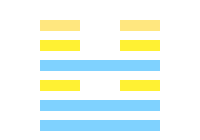18.4.6 (18 > 32)

18.4.6 (18 > 32) - THE KÛ HEXAGRAM.
- 4. The fourth line, divided, shows (a son) viewing indulgently the troubles caused by his father. If he go forward, he will find cause to regret it.
- 6. The sixth line, undivided, shows us one who does not serve either king or feudal lord, but in a lofty spirit prefers (to attend to) his own affairs.
18.4.6 (18 > 32) - Hiding one's face
One deliberately doesn't look at others in the face.
Bing DeepL Google Yandex18.4.6 (18 > 32) - Hiding one's face
One deliberately doesn't look at others in the face.
Bing DeepL Google Yandex18.4.6 (18 > 32) - Kù, l’élimination de la chose pourrie
[color=blue]Kū : délibération, embarras, trouble, soucis.
- 4. S’il a une indulgence funeste (pour les défauts de son père) et craint de le troubler (par des remontrances respectueuses), il en aura du regret.
- 6. Quand on ne veut pas servir le souverain ni les princes, c’est qu’on a trop de souci de ses propres affaires et qu’on ne veut s’occuper que d’elles. Les visées doivent être modérées.
18.4.6 (18 > 32) - Se cacher le visage
On fait exprès de ne pas regarder les autres en face.
Bing DeepL Google Yandex18.4.6 (18 > 32) - Rendetlenség
- 4. Nem kötelezik el magukat mert nem győzte meg őket.
- 6. Otthagyja a többieket hogy szétnézzen.
The trigrams
The trigrams are combinations of three yin and yang lines. The three bottom lines of the hexagram form the lower trigram and represent the inner situation. The three top lines form the upper trigram and represent the outer situation.
Upper trigram: The mountain The thunder


Lower trigram: The wind

The formation: 18
What is already there

18 - THE KÛ HEXAGRAM.
Kû indicates great progress and success (to him who deals properly with the condition represented by it). There will be advantage in (efforts like that of) crossing the great stream. (He should weigh well, however, the events of) three days before the turning point, and those (to be done) three days after it.
Bing DeepL Google Yandex18 - Disorder
One needs to abandon their affairs and make oneself available to patiently soften one's most embarrassing flaws, so that one can inspire confidence and be engaged by those who can help them.
Bing DeepL Google Yandex18 - Disorder
One needs to abandon their affairs and make oneself available to patiently soften one's most embarrassing flaws, so that one can inspire confidence and be engaged by those who can help them.
Bing DeepL Google Yandex18 - Kù, l’élimination de la chose pourrie
[color=blue]Kū : délibération, embarras, trouble, soucis.
Texte
La délibération, chose éminemment utile, fera triompher des difficultés. On doit délibérer trois jours avant d’agir ; puis trois jours après (sur les conséquences).
Symbolisme
C’est le vent sous la montagne. Le fort au-dessus, le petit au- dessous ; soumission chez l’un, droiture ferme chez l’autre ; c’est ce que représente le Koua kū. Aussi le grand doit encourager le peuple et développer les vertus.
Commentaire
Si l’on délibère sagement, le monde sera bien gouverné. Quand on va à une affaire, on doit délibérer trois jours avant et trois jours après.
18 - Le désordre
On a besoin d'abandonner ses affaires et se rendre disponible pour adoucir patiemment ses défauts les plus gênants, afin de pouvoir inspirer confiance et être engagé par ceux qui peuvent nous aider.
Bing DeepL Google Yandex18 - Rendetlenség
Fel kell hogy hagyjon az üzlettel
és hogy rendelkezésre állva türelmesen tompítsa a legtöbb kínos hibát, hogy képes legyen bizalmat sugallni és segítőtársakra leljen.

18.4 (18 > 50) - THE KÛ HEXAGRAM.
The fourth line, divided, shows (a son) viewing indulgently the troubles caused by his father. If he go forward, he will find cause to regret it.
Bing DeepL Google Yandex18.4 (18 > 50) - Failing close to goal
The others do not commit because one has not decided them.
Bing DeepL Google Yandex18.4 (18 > 50) - Failing close to goal
The others do not commit because one has not decided them.
Bing DeepL Google Yandex18.4 (18 > 50) - Kù, l’élimination de la chose pourrie
[color=blue]Kū : délibération, embarras, trouble, soucis.
S’il a une indulgence funeste (pour les défauts de son père) et craint de le troubler (par des remontrances respectueuses), il en aura du regret.
Bing DeepL Google Yandex18.4 (18 > 50) - Échouer près du but
Les autres ne s'engagent pas parce qu'on ne les a pas décidés.
Bing DeepL Google Yandex18.4 (18 > 50) - Rendetlenség
Nem kötelezik el magukat mert nem győzte meg őket.
Bing DeepL Google Yandex
18.6 (18 > 46) - THE KÛ HEXAGRAM.
The sixth line, undivided, shows us one who does not serve either king or feudal lord, but in a lofty spirit prefers (to attend to) his own affairs.
Bing DeepL Google Yandex18.6 (18 > 46) - Losing one's former allies
One lets others know that one will no longer support them.
Bing DeepL Google Yandex18.6 (18 > 46) - Losing one's former allies
One lets others know that one will no longer support them.
Bing DeepL Google Yandex18.6 (18 > 46) - Kù, l’élimination de la chose pourrie
[color=blue]Kū : délibération, embarras, trouble, soucis.
Quand on ne veut pas servir le souverain ni les princes, c’est qu’on a trop de souci de ses propres affaires et qu’on ne veut s’occuper que d’elles. Les visées doivent être modérées.
Bing DeepL Google Yandex18.6 (18 > 46) - Perdre ses anciens alliés
On fait savoir aux autres qu'on ne les soutiendra plus.
Bing DeepL Google YandexIn the making: 32
What is poised to happen

32 - THE HĂNG HEXAGRAM.
Hăng indicates successful progress and no error (in what it denotes). But the advantage will come from being firm and correct ; and movement in any direction whatever will be advantageous.
Bing DeepL Google Yandex32 - Perseverance
One must be careful before committing oneself, after one must continue.
Bing DeepL Google Yandex32 - Perseverance
One must be careful before committing oneself, after one must continue.
Bing DeepL Google Yandex32 - Hâng, la durée
Hāng : 1. Constance, permanence, stabilité ; 2. Partout, complètement ; 3. Lune presque pleine.
Texte
La vertu ferme, se développant sans défaillance, arrive à sa perfection et procure de l’avantage en tout et partout.
Symbolisme
Tonnerre et vent forment le Koua. Le sage reste ferme et ne change pas de conduite.
Commentaire
Hāng indique constance, permanence. C’est le fort en haut, le faible en bas (voir le Koua), le tonnerre et le vent en communication et concorde. C’est le moteur et le mû docile, la constance heureuse et la stabilité dans sa voie. La voie, les procédés du ciel et de la terre se perpétuent et ne cessent jamais. Le succès gît dans la persévérance en ce qu’on a commencé.
Le soleil et la lune, participant au ciel, perpétuent leur éclat. Les quatre saisons changeant et se succédant peuvent se perpétuer parfaitement. Le saint persévérant en sa voie, le monde se transforme et se perfectionne. En cette perpétuité, on peut voir les sentiments, les tendances du ciel et de la terre et de toutes choses
32 - La persévérance
On fait attention avant de s'engager, après on doit continuer.
Bing DeepL Google Yandex32 - Kitartás
Óvatosnak kell lenni mielőtt elköteleznénk magunkat másoknak, akik követni fognak.
Bing DeepL Google YandexThe nuclear hexagram: 54.3.5 (54 > 43)
The nuclear hexagram is the association of the two inner trigrams (lines 2,3,4 and 3,4,5). It represents the root, or the origin of the situation.

54.3.5 (54 > 43) - THE KWEI MEI HEXAGRAM.
- 3. The third line, divided, shows the younger sister who was to be married off in a mean position. She returns and accepts an ancillary position.
- 5. The fifth line, divided, reminds us of the marrying of the younger sister of (king) Tî-yî, when the sleeves of her the princess were not equal to those of the (still) younger sister who accompanied her in an inferior capacity. (The case suggests the thought of) the moon almost full. There will be good fortune.
54.3.5 (54 > 43) - Assistance
One fools everyone around by feigning to be seduced.
Bing DeepL Google Yandex54.3.5 (54 > 43) - Assistance
One fools everyone around by feigning to be seduced.
Bing DeepL Google Yandex54.3.5 (54 > 43) - Kvêi Mei, la fille à marier
Kvêi-Mei : marier une jeune sœur, une jeune fille.
- 3. Elle est comme un borgne qui voit encore, mais mal (qui ne voit d’un oeil). [Il lui sera avantageux de vivre retirée et ferme en sa vertu, de ne point faillir aux règles du devoir.]
-
5. Quand l’empereur Ti-Y maria sa sœur, les manches (le vêtement) de lamariée étaient moins richement ornées que celles de sa plus jeune sœur.
Note. Voir Koua II, texte II, § 5. La mariée avait perdu sa qualité de princesse royale.
Elle était comme la lune presque pleine (quant à sa vertu) de modestie, de soumission. C’était de très heureux augure. Telle fut sa noble conduite. [Ainsi elle maintint sa dignité dans la droiture.]
54.3.5 (54 > 43) - L'assistance
On trompe son monde en affectant d'être séduit.
Bing DeepL Google Yandex54.3.5 (54 > 43) - Támogatás
- 3. Elfogadja a fiatalabb készségeinek felhasználását mielőtt feladnák.
- 5. Visszatér miután a többieket kikérdezi.
Ruler
The starting situation

18.6 (18 > 46) - THE KÛ HEXAGRAM.
The sixth line, undivided, shows us one who does not serve either king or feudal lord, but in a lofty spirit prefers (to attend to) his own affairs.
Bing DeepL Google Yandex18.6 (18 > 46) - Losing one's former allies
One lets others know that one will no longer support them.
Bing DeepL Google Yandex18.6 (18 > 46) - Losing one's former allies
One lets others know that one will no longer support them.
Bing DeepL Google Yandex18.6 (18 > 46) - Kù, l’élimination de la chose pourrie
[color=blue]Kū : délibération, embarras, trouble, soucis.
Quand on ne veut pas servir le souverain ni les princes, c’est qu’on a trop de souci de ses propres affaires et qu’on ne veut s’occuper que d’elles. Les visées doivent être modérées.
Bing DeepL Google Yandex18.6 (18 > 46) - Perdre ses anciens alliés
On fait savoir aux autres qu'on ne les soutiendra plus.
Bing DeepL Google YandexCorrection
The direction where the ruler is going to bend

18.4 (18 > 50) - THE KÛ HEXAGRAM.
The fourth line, divided, shows (a son) viewing indulgently the troubles caused by his father. If he go forward, he will find cause to regret it.
Bing DeepL Google Yandex18.4 (18 > 50) - Failing close to goal
The others do not commit because one has not decided them.
Bing DeepL Google Yandex18.4 (18 > 50) - Failing close to goal
The others do not commit because one has not decided them.
Bing DeepL Google Yandex18.4 (18 > 50) - Kù, l’élimination de la chose pourrie
[color=blue]Kū : délibération, embarras, trouble, soucis.
S’il a une indulgence funeste (pour les défauts de son père) et craint de le troubler (par des remontrances respectueuses), il en aura du regret.
Bing DeepL Google Yandex18.4 (18 > 50) - Échouer près du but
Les autres ne s'engagent pas parce qu'on ne les a pas décidés.
Bing DeepL Google Yandex18.4 (18 > 50) - Rendetlenség
Nem kötelezik el magukat mert nem győzte meg őket.
Bing DeepL Google Yandex
